
What is Orange Shirt Day? Orange Shirt Day, also known as the National Day for Truth and Reconciliation, is observed annually on September 30 in Canada and the United States. This day raises awareness about the historical injustices faced by Indigenous children in residential schools and honors their experiences. The event was inspired by Phyllis Webstad, a residential school survivor whose new orange shirt was taken away on her first day at St. Joseph’s Mission residential school. The orange shirt symbolizes the loss of identity, culture, and self-esteem that countless Indigenous children endured. By wearing orange, people show solidarity and commitment to reconciliation, ensuring every child matters.
Key Takeaways:
- Orange Shirt Day, also known as the National Day for Truth and Reconciliation, honors Indigenous children's experiences and raises awareness about the historical injustices faced in residential schools.
- The day emphasizes the need for ongoing commitment to ensuring that such injustices are never repeated and that every child matters.
What is Orange Shirt Day?
Orange Shirt Day, also known as the National Day for Truth and Reconciliation, is observed annually on September 30. This day is dedicated to raising awareness about the historical injustices faced by Indigenous children in residential schools and honoring their experiences.
-
Purpose: Orange Shirt Day aims to raise awareness about the residential school system in Canada and its lasting impact on Indigenous communities.
-
Origin: The day originated from a grassroots movement initiated by the St. Joseph Mission Residential School Commemoration Project in 2013.
-
Inspiration: The event is inspired by the story of Phyllis Webstad, a residential school survivor who had her new orange shirt taken away on her first day at St. Joseph’s Mission residential school in British Columbia.
Why September 30?
The choice of date for Orange Shirt Day holds significant meaning. It coincides with the time of year when Indigenous children were forcibly taken from their families and sent to residential schools.
-
Date: Orange Shirt Day is observed on September 30, which coincides with the time of year when Indigenous children were forcibly taken from their families and sent to residential schools.
-
Symbolism: The orange shirt symbolizes the loss of identity, culture, and self-esteem that countless Indigenous children endured during their time in residential schools.
Understanding Residential Schools
Residential schools were institutions aimed at assimilating Indigenous children into Euro-Canadian culture. The impact of these schools was profound and devastating.
-
Residential Schools: Residential schools were church-run institutions where approximately 150,000 Métis, Inuit, and First Nations children were sent between the 1830s and 1996.
-
Goals: The primary goal of these schools was to assimilate Indigenous children into Euro-Canadian culture by suppressing their languages, cultures, and practices.
-
Impact: The residential school system inflicted immense harm on Indigenous children, including emotional, physical, and psychological suffering. Many children never returned home, and those who did lived with unimaginable trauma.
-
Mortality Rate: Studies have shown that there was a 40-60% mortality rate in residential schools, with many children dying due to disease or accidents.
Government Acknowledgment and Apology
The Canadian government has recognized the wrongs of the residential school system and has taken steps to apologize and reconcile with Indigenous communities.
- Government Acknowledgment: The Canadian government has acknowledged that the residential school system was wrong, cruel, and ineffective. An official apology was offered to Indigenous people in 2008.
Phyllis Webstad’s Story
Phyllis Webstad’s personal experience at a residential school is central to the creation of Orange Shirt Day. Her story highlights the emotional and cultural losses suffered by Indigenous children.
-
Phyllis Webstad’s Story: Phyllis Webstad’s story is central to Orange Shirt Day. She remembers wearing an orange shirt given by her grandmother on her first day at residential school but having it taken away by school authorities.
-
Intergenerational Trauma: The trauma experienced by Indigenous children in residential schools has had a lasting intergenerational impact, affecting communities to this day.
-
Healing Journey: Phyllis Webstad has been on a healing journey since her time at the residential school. She has spoken out about the need for reconciliation and healing.
-
Every Child Matters: The message that Phyllis wants to pass along on Orange Shirt Day is that every child matters. This slogan emphasizes the importance of recognizing the value and dignity of all children.
Educational Efforts and Community Involvement
Orange Shirt Day encourages education about residential schools and their legacy. It promotes learning about Indigenous cultures and histories.
-
Educational Efforts: Orange Shirt Day encourages education about residential schools and their legacy. It promotes learning about Indigenous cultures and histories.
-
Community Involvement: The day involves community activities such as wearing orange shirts, reading books about residential schools, and engaging in discussions about the impacts of these institutions.
National Day for Truth and Reconciliation
Orange Shirt Day is also known as the National Day for Truth and Reconciliation. This name emphasizes the need for truth-telling and reconciliation regarding the residential school system.
-
National Day for Truth and Reconciliation: Orange Shirt Day is also known as the National Day for Truth and Reconciliation. This name emphasizes the need for truth-telling and reconciliation regarding the residential school system.
-
Statutory Holiday: In some provinces, including Newfoundland and Labrador, September 30 is a statutory holiday, ensuring that schools and government offices are closed to observe the day.
International Impact
While initiated in Canada, Orange Shirt Day is also observed in the United States and has a growing global impact.
- International Impact: While initiated in Canada, Orange Shirt Day is also observed in the United States and has a growing global impact, with organizations like Cultural Survival participating in the event.
Truth and Reconciliation Commission
The Truth and Reconciliation Commission of Canada played a crucial role in documenting the history of residential schools and their impacts.
- Truth and Reconciliation Commission: The Truth and Reconciliation Commission of Canada, established in 2008, played a crucial role in documenting the history of residential schools and their impacts. The commission released 94 recommendations for reconciliation, many of which remain unimplemented.
UN Declaration on Rights of Indigenous Peoples
The UN Declaration on the Rights of Indigenous Peoples emphasizes the rights of Indigenous Peoples to live in freedom, peace, and security.
- UN Declaration on Rights of Indigenous Peoples: The UN Declaration on the Rights of Indigenous Peoples, particularly Article 7, emphasizes the right of Indigenous Peoples to live in freedom, peace, and security without being subjected to acts of genocide or violence, including forced removal of children.
Events and Activities
Various events are organized on Orange Shirt Day to honor the memories of those who did not survive residential schools and to support ongoing healing efforts.
-
Events and Activities: Various events are organized on Orange Shirt Day, including runs, walks, and gatherings to honor the memories of those who did not survive residential schools and to support ongoing healing efforts.
-
Phyllis Webstad’s Message: Phyllis Webstad’s message is clear: she wants people to understand that the color orange represents her feelings of worthlessness and insignificance during her time at the residential school.
-
Symbolic Gesture: Wearing an orange shirt on September 30 is a symbolic gesture of commitment to reconciliation and remembrance. It serves as a reminder of the historical injustices faced by Indigenous children.
Educational Resources
There are various educational resources available to help people learn about residential schools and their impacts.
-
Educational Resources: There are various educational resources available, including books by Indigenous authors and Phyllis Webstad’s story, which can be read in multiple languages.
-
Community Engagement: The day encourages community engagement through activities like tracing hands and writing messages about how to help others feel valued.
Social Media Campaigns
Social media campaigns play a significant role in spreading awareness about Orange Shirt Day.
- Social Media Campaigns: Social media campaigns often accompany Orange Shirt Day, with hashtags like #OrangeShirtDay and #EveryChildMatters spreading awareness about the event.
Government Support
Governments have shown support for Orange Shirt Day by designating it a statutory holiday in some provinces and encouraging public participation.
- Government Support: Governments have shown support for Orange Shirt Day by designating it a statutory holiday in some provinces and encouraging public participation.
Cultural Diversity Training
Organizations offer cultural diversity training sessions to educate people about residential schools and their lasting impacts on Indigenous communities.
- Cultural Diversity Training: Organizations offer cultural diversity training sessions to educate people about residential schools and their lasting impacts on Indigenous communities.
Healing Process
The healing process for Indigenous communities is ongoing. Orange Shirt Day serves as a reminder of the need for continued efforts towards reconciliation and healing.
- Healing Process: The healing process for Indigenous communities is ongoing. Orange Shirt Day serves as a reminder of the need for continued efforts towards reconciliation and healing.
Intergenerational Impact
The intergenerational impact of residential schools is evident in the stories shared by survivors and their families.
- Intergenerational Impact: The intergenerational impact of residential schools is evident in the stories shared by survivors and their families. This impact continues to affect communities today.
Historical Context
Understanding the historical context of residential schools is crucial for grasping the significance of Orange Shirt Day.
- Historical Context: Understanding the historical context of residential schools is crucial for grasping the significance of Orange Shirt Day. These schools were part of a broader policy aimed at assimilating Indigenous Peoples into Canadian society.
Survivor Stories
Survivor stories like Phyllis Webstad’s are essential for sharing the experiences of those who attended residential schools.
- Survivor Stories: Survivor stories like Phyllis Webstad’s are essential for sharing the experiences of those who attended residential schools. These stories help in raising awareness about the injustices faced by Indigenous children.
Reconciliation Efforts
Reconciliation efforts are ongoing in Canada. Orange Shirt Day is part of these efforts, emphasizing the need for truth-telling, education, and community engagement.
- Reconciliation Efforts: Reconciliation efforts are ongoing in Canada. Orange Shirt Day is part of these efforts, emphasizing the need for truth-telling, education, and community engagement.
Global Solidarity
The event has gained global solidarity, with organizations and communities around the world participating in events and activities to honor the memories of Indigenous children who suffered in residential schools.
- Global Solidarity: The event has gained global solidarity, with organizations and communities around the world participating in events and activities to honor the memories of Indigenous children who suffered in residential schools.
Statutory Holiday Observance
The second statutory holiday observation of Orange Shirt Day in Canada will commemorate the missing and murdered children from residential schools and honor the healing journeys of residential school survivors.
- Statutory Holiday Observance: The second statutory holiday observation of Orange Shirt Day in Canada will commemorate the missing and murdered children from residential schools and honor the healing journeys of residential school survivors.
Local Initiatives
Local initiatives such as the Orange Shirt Day Run/Walk in Edmonton, Alberta, aim to raise funds for the OrangeShirtDay.org and support Indigenous athletes.
- Local Initiatives: Local initiatives such as the Orange Shirt Day Run/Walk in Edmonton, Alberta, aim to raise funds for the OrangeShirtDay.org and support Indigenous athletes.
Morning Wave and Wear Your Orange Shirt
Morning wave and wear your orange shirt events are organized in various locations to start the day with a symbol of commitment to reconciliation and remembrance.
- Morning Wave and Wear Your Orange Shirt: Morning wave and wear your orange shirt events are organized in various locations to start the day with a symbol of commitment to reconciliation and remembrance.
Evening Gatherings
Evening gatherings like the one at Eklutna Powwow Grounds in Anchorage, Alaska, serve as a potluck event to honor the National Day of Remembrance of US Indian Boarding Schools/Orange Shirt Day.
- Evening Gatherings: Evening gatherings like the one at Eklutna Powwow Grounds in Anchorage, Alaska, serve as a potluck event to honor the National Day of Remembrance of US Indian Boarding Schools/Orange Shirt Day.
Commitment to Action
The day encourages meaningful action beyond symbolic gestures. It emphasizes the need for ongoing commitment to ensuring that such injustices are never repeated and that every child matters.
- Commitment to Action: The day encourages meaningful action beyond symbolic gestures. It emphasizes the need for ongoing commitment to ensuring that such injustices are never repeated and that every child matters.
Honoring the Past, Building the Future
Orange Shirt Day is more than just a day to wear orange. It's a powerful reminder of the historical injustices faced by Indigenous children in residential schools. This day, observed on September 30, encourages us to reflect on the past and commit to a future of reconciliation and healing. By understanding stories like Phyllis Webstad's, we honor the experiences of survivors and acknowledge the lasting impact of these institutions. Community activities, educational efforts, and symbolic gestures like wearing orange shirts all play a role in fostering awareness and change. Let's continue to educate ourselves, support Indigenous communities, and ensure that every child matters. Together, we can build a more inclusive and equitable society, where the mistakes of the past are never repeated.
Frequently Asked Questions
Was this page helpful?
Our commitment to delivering trustworthy and engaging content is at the heart of what we do. Each fact on our site is contributed by real users like you, bringing a wealth of diverse insights and information. To ensure the highest standards of accuracy and reliability, our dedicated editors meticulously review each submission. This process guarantees that the facts we share are not only fascinating but also credible. Trust in our commitment to quality and authenticity as you explore and learn with us.


